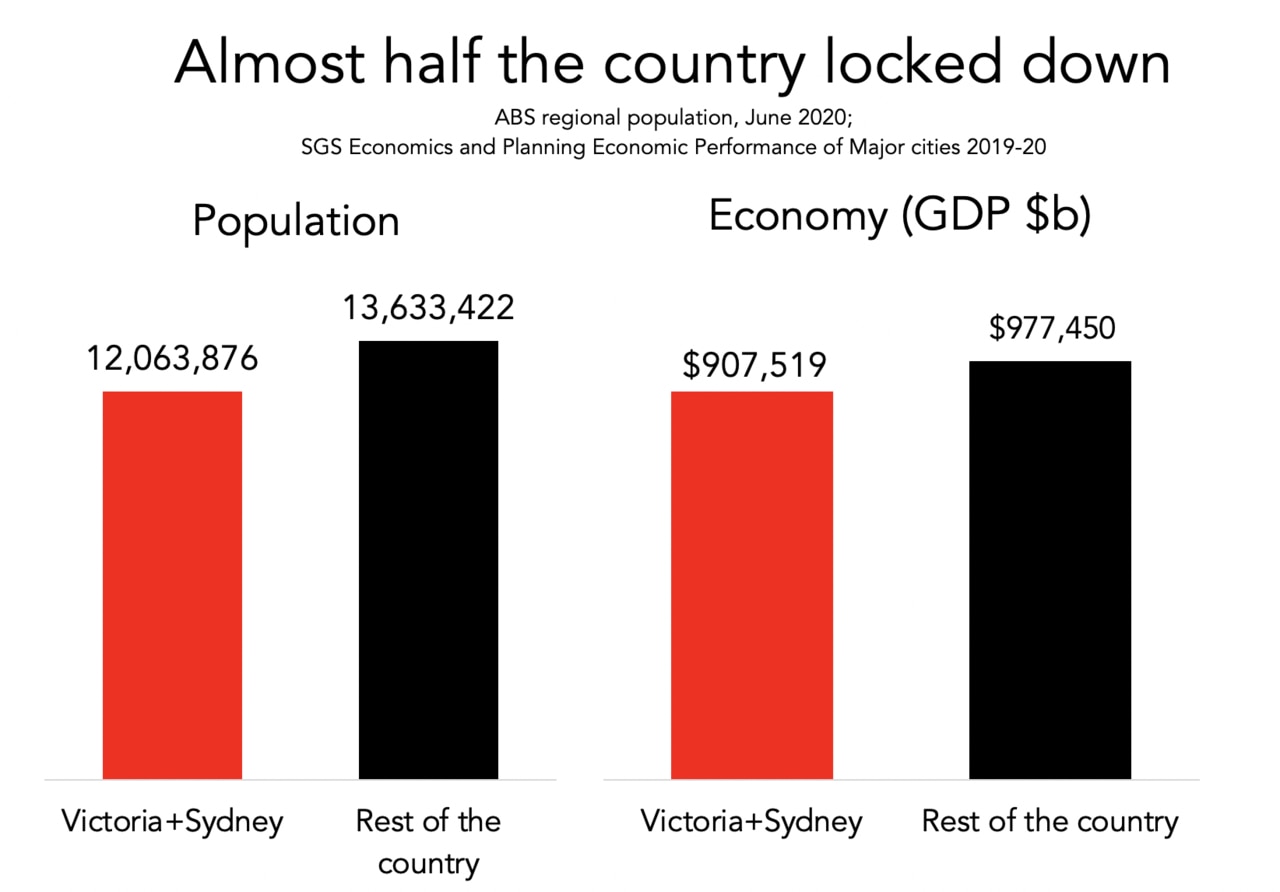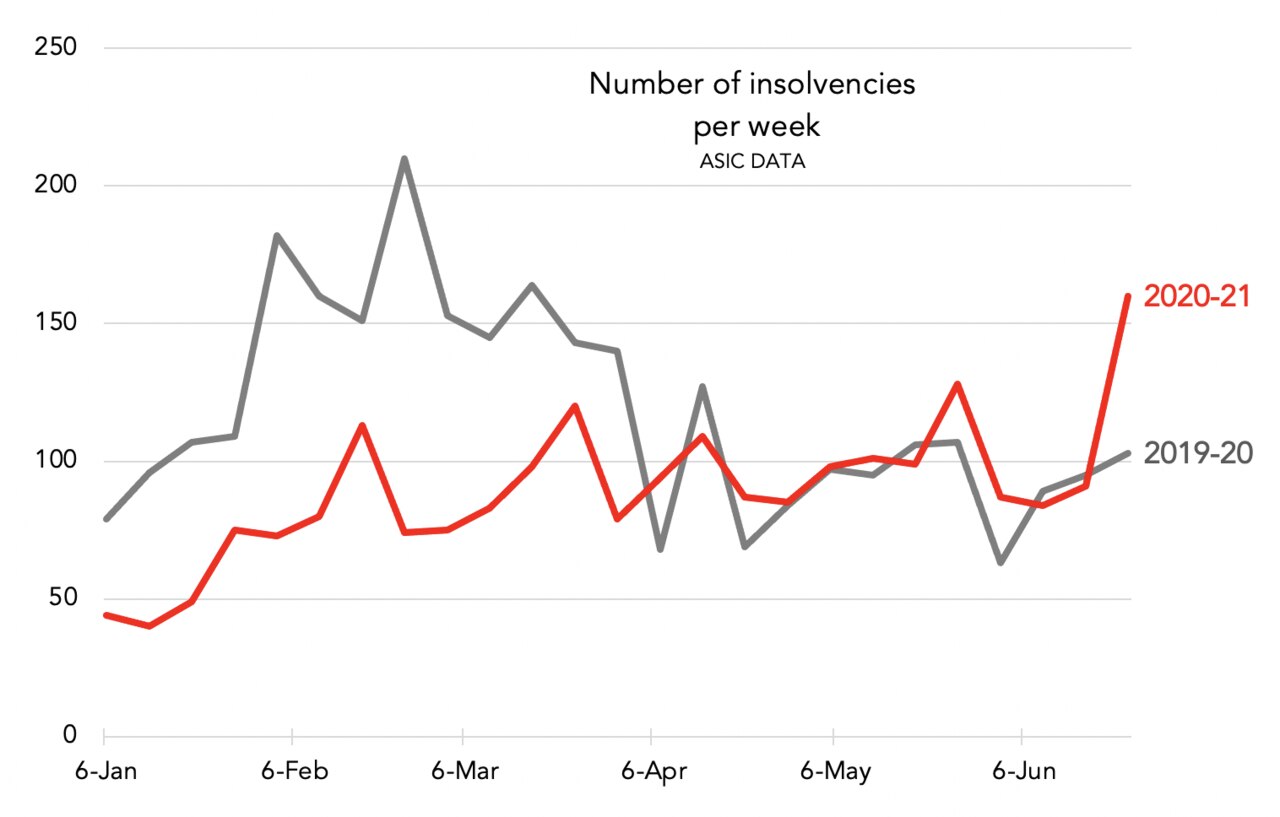Australia’s economic progress in peril as almost half the country plunged into lockdown
A key figure is pointing to dire times ahead for Australians as half the country deals with the economic consequences of lockdowns.
As Victoria follows NSW into lockdown, half of the country is now trapped at home and Australia’s recent economic progress is in peril.
Australia’s economic recovery so far in 2020 has been something to be delighted about. Just the other day the unemployment rate fell to a very impressive 4.9 per cent, the first time it’s been under 5 per cent since 2011. Australia’s Treasurer, Josh Frydenberg, was out and about boasting about the result. And fair enough.
But that number was for June. July is shaping up to be a different story for Australia as the Delta strain attacks our major economic centres – Sydney and Melbourne.
Sydney’s lockdown began on 26 June and Victoria followed on 16 July.
As the chart below shows, the state of Victoria and the city of Sydney combined have over 12 million people, which is nearly half of Australia’s population. Victoria and Sydney combined are also over 48 per cent of our economic output. Chuck in the parts of Greater Sydney that are included and the situation is even more dire.
RELATED: Greater Sydney’s lockdown extended by two weeks

It feels like 2020 all over again. All the progress we have made – improving quarantine, understanding how the virus is spread, much better contact tracing – still leaves us neck and neck with the virus. Meanwhile the progress we haven’t made – getting everyone vaccinated – is suddenly a big problem.
This time around the economy is less well defended than in 2020, thanks to the absence of JobKeeper and the higher rates of JobSeeker. Those both finished up in March, back when most of us optimistically thought the virus was behind us. The economic painkillers have worn off and now the pandemic is hurting us. Businesses are going broke more often than last year – the rate of insolvencies in the most recent week of official data is 55 per cent higher than the same week in 2021.
RELATED: Backlash over non-essential luxury retail stores open

Sydney and Melbourne are going to have to get through this on their own. We saw how heavily a long lockdown suppressed economic activity in Victoria last year. It was hard for Victoria to defeat the Alpha strain. Now both states are up against a more fearsome foe: Delta.
Everyone vs the variants
The novel coronavirus, well, it keeps getting more novel. It has mutated several times to become more dangerous, with the Delta strain both more transmissible and more deadly. Who knows if that will be the last variant of concern. The genetic code in the virus has a chance of making a new variation each time it replicates. And the more people are infected, the more often it replicates.
The last dangerous variant came from India which is where the major outbreak was six months ago. Now Indonesia – the world’s fourth most populous country – has the worst outbreak in the world. We know all bout the Alpha and Delta variants. Beta, Gamma and Kappa are out there too. But how many Greek letters will we get through before this is over? It is possible the World Health Organisation was being over-optimistic when they chose an alphabet with only 24 letters to represent the new variants.
The hope
There is some good news about the economic effect of a lockdown. And that is that an economy is actually hard to totally suppress.
If you ban shopping in person, shopping online booms. If you ban drinking in pubs, up goes drinking in homes. If you make it hard to go out, people spend on doing up their homes. If it is challenging to spend on services, people buy goods. This effect is big enough that the Reserve Bank of Australia (RBA) has noticed it:
“(It goes) beyond the obvious substitutions, such as from restaurant meals, to groceries to cook at home,” RBA deputy governor Luci Ellis said in June this year.
“Sports equipment substituted for closed gyms, toys and games for organised children’s activities. And with more time at home, people renovated, redecorated and kitted out home offices.”
Netflix wins when cinemas lose; Dan Murphy’s wins when the pubs lose. Coles wins when restaurants lose. And if it is hard to spend during lockdown, some – not all, but some – of that spending happens after lockdown. Holidays in September get extra popular if holidays in August are cancelled, for example.
Which is to say that the early statistics on how big the effect of lockdown is can be a trifle misleading. Bear this in mind when you hear about the statistics on the lockdown.
The effect is going to be massive with half the country locked down. But it might not be quite as big as it appears at first.
Jason Murphy is an economist | @jasemurphy. He is the author of the book Incentivology.




